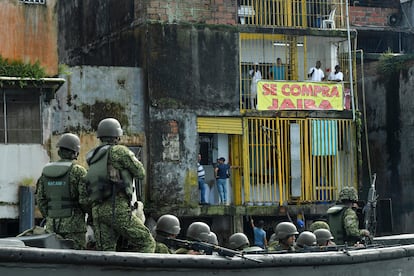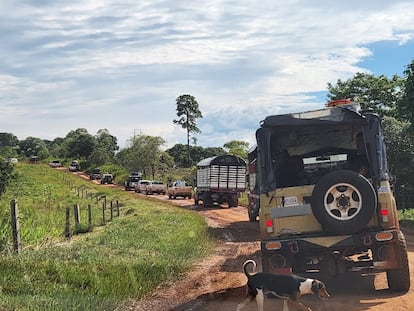Terror returns to Colombian city meant to be a laboratory for Petro’s ‘total peace’
The governor of Buenaventura, the country’s main seaport, has asked authorities to send in the army to protect the population from armed gangs engaged in turf wars

The hope of a few months ago now seems to be dead in Buenaventura, Colombia’s main seaport. The government’s call for peace at the end of 2022, which intended to start talks with the gangs that operate in the city and get them to disband peacefully, has made way for an upsurge in violence. A truce agreed with the main gangs in the area, Los Shottas and Los Espartanos, managed to prevent violent deaths at the end of last year, but in recent months there have been new homicides, clashes and the emergence of new armed actors. Some gangs have been replaced by others, who terrorize the population and keep them shut indoors. In a video circulating on social media networks, the armed criminals warn, “We are going to defend them with our lives. We will defend them with blood and fire.”
Since before taking office, the leftist president Gustavo Petro had expressed his intention to prioritize dialogue to find an end to the conflict. Under the name of total peace, which was how he called his initiative — despite the fact that he recently claimed it was the media that invented that term — he assured that his administration would create the conditions for a wide variety of illegal groups to submit to justice and lay down their arms. Doubts and questions, especially regarding the selection criteria of the groups that could benefit from the proposal, were not an obstacle for Congress to approve Law 2272, which established the legal framework for these negotiations to take place.
Last October, with the mediation of the Catholic Diocese of Buenaventura and the local Community Action Board, Los Shottas and Los Espartanos agreed to suspend their war activities. This decision was viewed as a demonstration of good faith by both groups regarding their interest in collaborating in the search for peace. At first, everything looked fine. Petro himself celebrated the fact that the city had gone more than 85 days without homicides and added that the security situation was positive when compared to “many cities in the United States.”
The apparent calm, however, ended in April, when shootings between gang members returned to different neighborhoods of the port. Everything indicates that the disappearance and possible death of “Super,” one of the spokesmen for Los Shottas in the talks with the government, was the breaking point for the violence. In a statement, the Office of the High Commissioner for Peace expressed its solidarity with the gang member’s family and called for a “return to the climate of calm and trust that was achieved in the city” during the previous months. The situation, however, had already gotten out of hand.
The straw that broke the camel’s back was a video that began circulating this week on social networks, which shows a dozen armed and hooded men. “We are going to defend them with our lives. We will defend them with blood and fire. Jalisco does not exist here, Jalisco is in Mexico. We are Buenaventura!” the man holding the camera is heard saying. According to preliminary information, these are members of Los Roberts who are threatening the Jalisco gang, an organization that works hand in hand with the Mexican Jalisco Nueva Generación cartel. These are two new armed groups, different from Los Shottas and Los Espartanos, that are entering the already disputed territorial struggle taking place in the area.
“On behalf of the Valle del Cauca, I request to please militarize the entire special district of Buenaventura immediately. It is urgent to protect the community and put an end to illegal economies,” Governor Clara Luz Roldán wrote to President Petro and Iván Velásquez, his defense minister. The situation, in Roldán’s opinion, is so dire that it is necessary for “the Army to arrive, occupy the entire territory, protect the community and stay.”
Her request received a response within a few hours from the Office of the High Commissioner for Peace, announcing that it will implement spaces for conversation to reach “public commitments” with illegal actors and inviting them to “keep the hope alive.” Minister Velásquez, for his part, announced the activation of a “joint strategy of the Public Force, Prosecutor’s Office and the Government of Valle del Cauca to guarantee the protection of the people of Buenaventura.”
The current scenario regarding total peace implies an enormous challenge for the government. The failure of the peace laboratory in Buenaventura, intended as a model to export to the rest of the country, would be a deep wound to one of the president’s top priorities.
Sign up for our weekly newsletter to get more English-language news coverage from EL PAÍS USA Edition









































